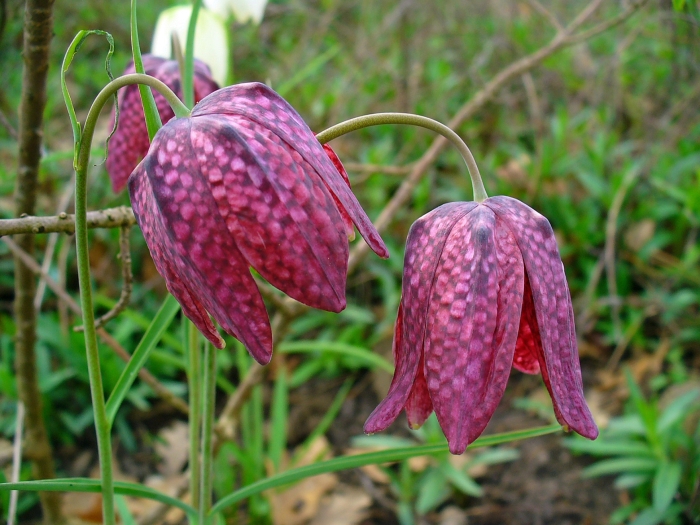Chequered Lily
(Fritillaria meleagris)
Chequered Lily (Fritillaria meleagris)
/
/

H. Zell
CC BY-SA 3.0
Image By:
H. Zell
Recorded By:
Copyright:
CC BY-SA 3.0
Copyright Notice:
Photo by: H. Zell | License Type: CC BY-SA 3.0 | License URL: https://creativecommons.org/licenses/by-sa/3.0 | Uploader: Llez | Publisher: Wikimedia Commons | Title: Fritillaria_meleagris_002.JPG | Notes: {{Information |Description ={{en|1=Location taken: Else Kientzler Botanical Garden, Sarchi Norte, Costa Rica. Names: Furcraea cabuya Trel. Classification: Plantae > Magnoliophyta > Liliopsida > Asparagales > Asparagaceae > Agaveae > Furcraea... |























































Estimated Native Range
Summary
Fritillaria meleagris, commonly known as Chequered Lily or Snake’s Head Fritillary, is a deciduous perennial bulb native to a range of habitats including damp woodlands, grasslands, and river flood plains in Central and Eastern Europe, extending into Western Siberia. It typically grows to a height of 15–40 cm (6–16 in) and is known for its unique, nodding, bell-shaped flowers with a distinctive chequered pattern in shades of purple, or sometimes pure white, blooming from March to May. The flowers are considered highly ornamental and are a highlight of the spring garden. The plant’s bulb is button-shaped, about 2 cm (0.79 in) in diameter, and contains poisonous alkaloids that can deter pests and grazing animals.
Chequered Lily is valued for its striking flowers and is often used in naturalistic plantings, rock gardens, and as underplanting for deciduous shrubs and trees. It has a preference for moist, well-drained soils rich in organic matter and can thrive in both full sun and part shade. While it is relatively easy to maintain, it requires protection from the scarlet lily beetle, which poses a significant threat. The species and the pure white-flowered variety, F. meleagris var. unicolor subvar. alba, have been recognized with the Royal Horticultural Society’s Award of Garden Merit, indicating their exceptional qualities for garden use. Cultivars offer a range of colors and patterns, adding diversity to spring displays. Despite its beauty, gardeners should be cautious as it can be toxic if ingested and may cause skin irritation.CC BY-SA 4.0
Chequered Lily is valued for its striking flowers and is often used in naturalistic plantings, rock gardens, and as underplanting for deciduous shrubs and trees. It has a preference for moist, well-drained soils rich in organic matter and can thrive in both full sun and part shade. While it is relatively easy to maintain, it requires protection from the scarlet lily beetle, which poses a significant threat. The species and the pure white-flowered variety, F. meleagris var. unicolor subvar. alba, have been recognized with the Royal Horticultural Society’s Award of Garden Merit, indicating their exceptional qualities for garden use. Cultivars offer a range of colors and patterns, adding diversity to spring displays. Despite its beauty, gardeners should be cautious as it can be toxic if ingested and may cause skin irritation.CC BY-SA 4.0
Plant Description
- Plant Type: Bulb
- Height: 0.8-1 feet
- Width: 0.5-0.8 feet
- Growth Rate: Moderate
- Flower Color: Purple, Pink, White
- Flowering Season: Spring
- Leaf Retention: Deciduous
Growth Requirements
- Sun: Full Sun, Part Shade
- Water: Medium
- Drainage: Slow, Medium, Fast
Common Uses
Bee Garden, Border Plant, Deer Resistant, Low Maintenance, Potted Plant, Rabbit Resistant, Rock Garden, Showy Flowers
Natural Habitat
Native to damp woodlands, grasslands, and river flood plains
Other Names
Common Names: Snake’s Head Fritillary, Snake’s Head, Chess Flower, Frog-Cup, Guinea-Hen Flower, Guinea Flower, Leper Lily, Fritillary, Chequered-Lily, Lazarus Bell
Scientific Names: , Fritillaria meleagris, Fritillaria lutea, Fritillaria montana, Fritillaria meleagris subsp. meleagris, Fritillaria meleagris var. contorta, Lilium meleagris, Fritillaria pallida, Fritillaria contorta, Fritillaria glaucescens
GBIF Accepted Name: Fritillaria meleagris L.